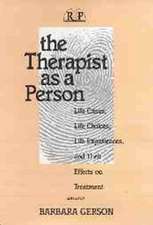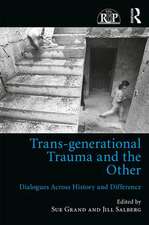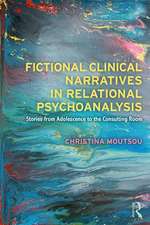Psychoanalytic Reflections
Autor Sandra Buechleren Limba Engleză Paperback – oct 2017
How do we each create a personally resonant way of thinking about treatment? I believe that most people who have had only graduate school training have not yet developed what I would call their signature style. They may have many styles, or techniques they have learned. But, often, they do not have a clinical identity, a core of strongly held beliefs about what is important to them in the work they do. Post graduate training is a place to develop those beliefs. To me, most of the work in any identity building task is accomplished through contrasts. By seeing what goes on in his friend's home, the ten year old child understands that his parents' way of functioning is not the only possibility. Similarly, in training, by hearing how differently various teachers and supervisors think about treatment, we can examine, validate, and modify our core beliefs about the work, and eventually forge that signature style. This style does not tell us what to say in any session. Nothing can, fortunately, I would say. Treatment always has to remain a live response to real moments with another person. It can never be reduced to formulas, recipes, manuals, pre-programmed sound bites.
We each search, our whole careers, for what really helps anyone have a richer life. For me, the poet, Rilke best captured what makes our work so hard, and so worthwhile. In his Letters to a Young Poet (pp. 23-24) Rilke says, "...at bottom, and just in the deepest and most important things, we are unutterably alone, and for one person to be able to advise or even help another, a lot must happen, a lot must go well, a whole constellation of things must come right in order once to succeed."
Preț: 198.00 lei
Nou
37.91€ • 39.55$ • 31.77£
Carte disponibilă
Livrare economică 19 februarie-05 martie
Specificații
ISBN-10: 0998083399
Pagini: 322
Dimensiuni: 152 x 229 x 18 mm
Greutate: 0.43 kg
Editura: Ipbooks
Descriere
My friend Peter Shabad quotes Soren Kierkegard, who said that life can only be understood backwards, but it must be lived forwards. In thinking about the papers that make up this volume, I see themes that took a good deal of time to coalesce in my own mind. For example, I wrote papers on the analyst's hope, courage, and integrity long before they emerged in my mind as "clinical values," and formed the nucleus of my first book.
How do we each create a personally resonant way of thinking about treatment? I believe that most people who have had only graduate school training have not yet developed what I would call their signature style. They may have many styles, or techniques they have learned. But, often, they do not have a clinical identity, a core of strongly held beliefs about what is important to them in the work they do. Post graduate training is a place to develop those beliefs. To me, most of the work in any identity building task is accomplished through contrasts. By seeing what goes on in his friend's home, the ten year old child understands that his parents' way of functioning is not the only possibility. Similarly, in training, by hearing how differently various teachers and supervisors think about treatment, we can examine, validate, and modify our core beliefs about the work, and eventually forge that signature style. This style does not tell us what to say in any session. Nothing can, fortunately, I would say. Treatment always has to remain a live response to real moments with another person. It can never be reduced to formulas, recipes, manuals, pre-programmed sound bites.
We each search, our whole careers, for what really helps anyone have a richer life. For me, the poet, Rilke best captured what makes our work so hard, and so worthwhile. In his Letters to a Young Poet (pp. 23-24) Rilke says, ..".at bottom, and just in the deepest and most important things, we are unutterably alone, and for one person to be able to advise or even help another, a lot must happen, a lot must go well, a whole constellation of things must come right in order once to succeed."






